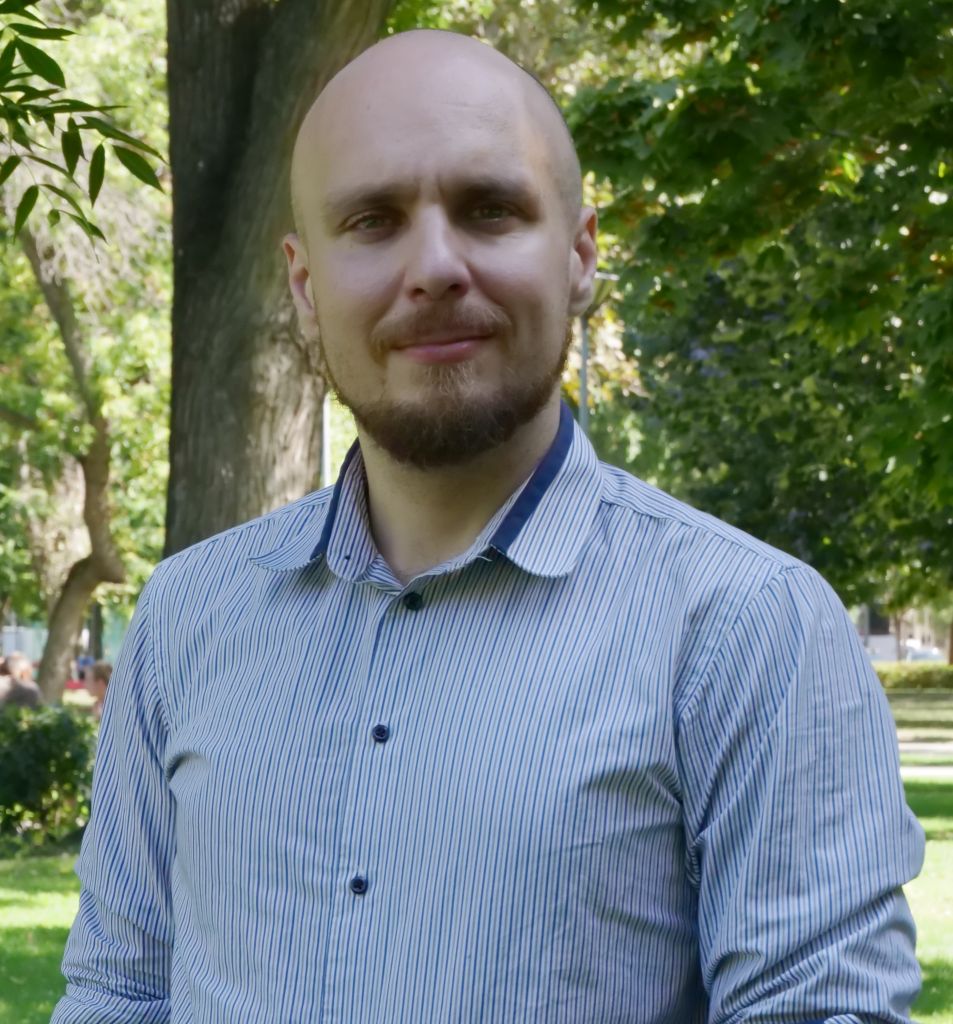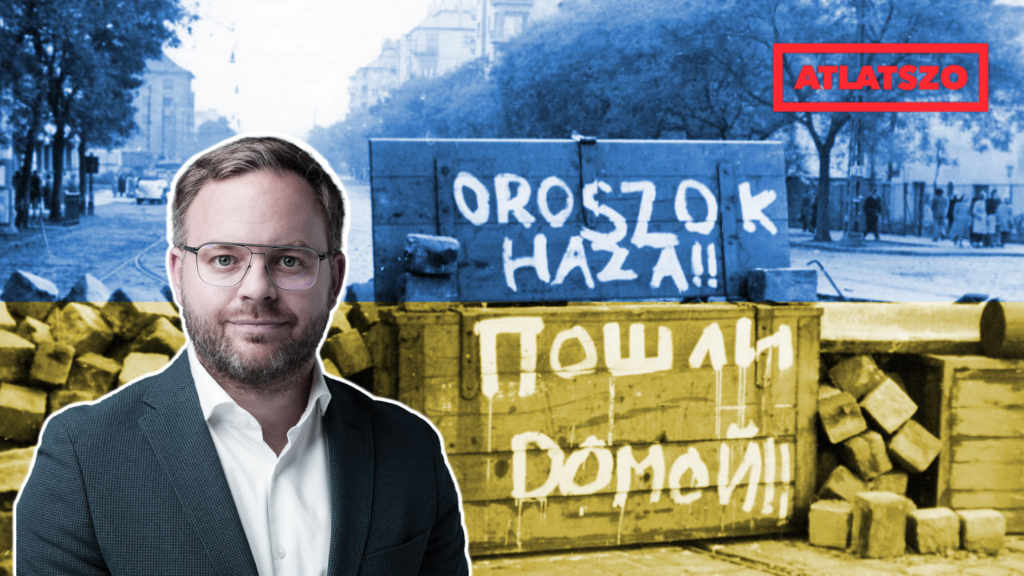The https://english.atlatszo.hu use cookies to track and profile customers such as action tags and pixel tracking on our website to assist our marketing. On our website we use technical, analytical, marketing and preference cookies. These are necessary for our site to work properly and to give us inforamation about how our site is used. See Cookies Policy
Learned helplessness: Balázs Orbán, Ukraine and Hungarian historical memory
The phrase „saying the quiet part loud” is often used in American politics to describe a statement by a public figure that exposes the unpleasant truth behind well-constructed political posturing. Something everyone suspects, politicians might even admit it to themselves but would dare not say it out in the open. The phrase describes perfectly the recent gaffe made by Balázs Orbán, one of the Prime Minister’s advisers, who, commenting on the war in Ukraine said that the experience of the 1956 Hungarian revolution teaches us that it is inadvisable to defend oneself against Russian aggression.
The truth exposed by this statement is not even that the government would commit treason in the event of Russian aggression against Hungary. It is that the lessons drawn by the Hungarian political community from 1956 (and other events) are critical to understand their position on Ukraine’s defensive war.

500 years of the same story
The mainstream narrative of Hungarian history sees the past as a series of tragedies and injustices (safe for ancient history). The same story has been retold over and over again since the Ottoman invasion of 1526.
The characters in the story are as follows: a small Central-Eastern European (i.e. geopolitically vulnerable) country, that is, us; an aggressor superpower; and the cynical, untrustworthy West, which could help us but looks the other way.
In 1526, the Ottoman Empire overwhelmed the Hungarians while the West offered no help, despite Hungary’s long history of the „defender of Christian Europe”. In 1849, the Hungarian War of Independence – the last of the Spring of Nations revolutions in Europe – was finally crushed by the Habsburg and Russian imperial overlords. In WW2, the regime of Regent Horthy hoped for the Western allies to push towards Hungary from the Adriatic Sea, allowing him to break out of the alliance with Hitler – but the logic of great power politics prevailed and Hungary was tossed to the Soviets. The most recent example is 1956 when the Soviet Empire defeated the Hungarian rebels as they received no Western aid.
Based on Hungarian historical experience and memory, this is how the world works. Small nations are trampled by great powers who can do with them as they please. Heroes who try to fight against this can at best win moral victories.
Why be angry at Ukraine and not Russia?
The official narrative of the Hungarian government is that they are trying to prevent further unnecessary suffering of the Ukrainians and therefore want “peace at any cost” as soon as possible. The falsity of this narrative is easily exposed by the fact that in two and a half years the Orbán government failed to present any proposal on how to settle the conflicts between Russia and Ukraine (unlike China and Brazil, who are genuinely seeking to play the role of mediators and thus have presented their peace plans).
It is also telling that the key opinion leaders aligned with the government, which supposedly wants to do something about Ukraine’s suffering, often react with naked joy at the destruction caused by Russia, cheering at bombings and at the losses of the Ukrainian army (where the fallen may well be ethnic Hungarian soldiers from Transcarpathia). All this shows that the anger towards the Ukrainian defense has deeper roots.
When Russian tanks moved towards Ukraine, everyone expected another 1956, based on Hungarian historical experience and memory.
That the imperial force will quickly overwhelm the resistance of the small nation, and those who resist will die heroic deaths or fall victim to a crackdown, while the hypocritical West once again cynically looks the other way – as is the order of things.
If this scenario were to play out, there would probably now be much greater sympathy for the Ukrainian people among the supporters of Orbán (in the early days of the war, when a ’56 scenario was a distinct possibility, there was a broad social consensus across party lines in Hungary that we have an obligation to help Ukrainian refugees).
Instead, however, the well-known characters of the story refused to play their assigned roles. The troops of the aggressor great power were stopped by the resistance of the small Central-Eastern European country, and the West did not look away but started to send them weapons, which, moreover, made the resistance even more effective and allowed it to hold its ground until today.
Over the last two and half years, the Orbán government tried repeatedly to get the West to stop Western arms shipments to Ukraine.
In reality, they tried to force the well-known story to play out, thus restoring order to the world.
In the public discourse directed by Orbán’s allies, the anger about the war is directed exclusively at Ukraine and the West, as in, the two actors who, despite Orbán’s best efforts, are refusing to play their role.
On the other hand, they are much more lenient to Russia, who are doing in the occupied territories exactly what one would expect from the aggressor power.
The lessons of 1956
The insurgents of 1956 (as well as the ’48 revolutionaries, the heroes of the Ottoman wars, etc.) are considered national heroes because they were underdogs standing up to a much stronger aggressor to defend a just cause – national sovereignty. In tension with this is the Hungarian government’s narrative that paints Ukrainian defenders as murderous villains for doing the same thing.
This cognitive dissonance has to be resolved somehow. One way to do this is to reinterpret the history of ’56. Viktor Orbán made a clumsy attempt at this when he said that the freedom fighters fought the Russians in ’56 because „they wanted a ceasefire and peace negotiations.”
From the government’s point of view, it would be best if they could completely rewrite the history of ’56, in a way that is similar to the way it is done in today’s Russia.
Russian historians paint 1956 as the first ‘color revolution’, sparked by the US secret services, making the Soviet intervention at least excusable, and turning János Kádár – the leader of the collaborationist government and subsequent dictator of Communist Hungary for 30 years – the real hero of the story.
It is however too late for such an extreme degree of historical revisionism, especially after Orbán even had a tribute to insurgents (“our freedom today is born out of our 1956 revolution”) into the constitution of Hungary.
The alternative is to reject any parallel between ’56 and 2022. So let’s believe that Russia is not the aggressor, but is fighting a just war. “Euromaidan was Fascist”, “the West has encroached on Russia’s sphere of interest”, and “there is no Ukrainian state, it has always been Russian territory” – such claims constitute the dominant narrative in the media associated with the Hungarian government, parroting the Russian casus belli.
The problem is that no member of the government could ever utter any of these arguments publicly, as it would put Hungary on a platform not even with Belarus, but with North Korea and Iran.
In other words, to resolve the previous tension, they just created another one, which led to Balázs Orbán’s slip-up.
Balázs Orbán’s statement is problematic because if there is a parallel between ’56 and 2022, it raises very uncomfortable questions from a Hungarian perspective. If Ukraine can resist the aggression of a great power, for which it receives Western assistance, is the story we have been telling about ourselves false? Why did we fail to stop the aggressor and obtain Western support if others can do it? In the classic ’56 narrative, the West is chastised for refusing to help the Hungarians in their struggle – but isn’t the Hungarian leadership doing the same thing now?
Balázs Orbán’s answer to these questions was, essentially, that we should be happy that we did not get any help from the West, because at least the struggle for freedom did not drag on for too long, and fewer people died.
In doing so, he was taking up the legacy of János Kádár instead of Imre Nagy, the martyred leader of the revolutionary government. To be fair to him, he was only following his boss’s lead: two years ago, Viktor Orbán also unfavorably compared Volodymyr Zelensky to Imre Nagy.
Learned helplessness is the apathetic behavior often stemming from childhood abuse. Wouldn’t the same apply to communities?
In light of the above historical experience, Balázs Orbán is probably not the only one to conclude that it is worth following the example of collaborators rather than resisters.
Russia’s openly stated foreign policy goal is to replace the so-called rule-based (Wilsonian) world order with power-based realpolitik where the world map is divided into spheres of interest by great powers. This change, also referred to as the „multipolar world order”, is welcomed by Hungarian leaders, even though according to this logic Hungary would no longer be a sovereign state either, but just a card in the hand of one of the great powers.
The story that we tell about ’56, ’48, Mohács, and so on is the story of this very realpolitik of great powers. And if there is a lesson to be learned, it is that such an order is not something we should help to build.
Written and translated by Zalán Zubor. Hungarian version of this story can be found here. Cover image: Montage by Atlatszo
Share:
Your support matters. Your donation helps us to uncover the truth.
- PayPal
- Bank transfer
- Patreon
- Benevity
Support our work with a PayPal donation to the Átlátszónet Foundation! Thank you.
Support our work by bank transfer to the account of the Átlátszónet Foundation. Please add in the comments: “Donation”
Beneficiary: Átlátszónet Alapítvány, bank name and address: Raiffeisen Bank, H-1054 Budapest, Akadémia utca 6.
EUR: IBAN HU36 1201 1265 0142 5189 0040 0002
USD: IBAN HU36 1201 1265 0142 5189 0050 0009
HUF: IBAN HU78 1201 1265 0142 5189 0030 0005
SWIFT: UBRTHUHB
Be a follower on Patreon
Support us on Benevity!

